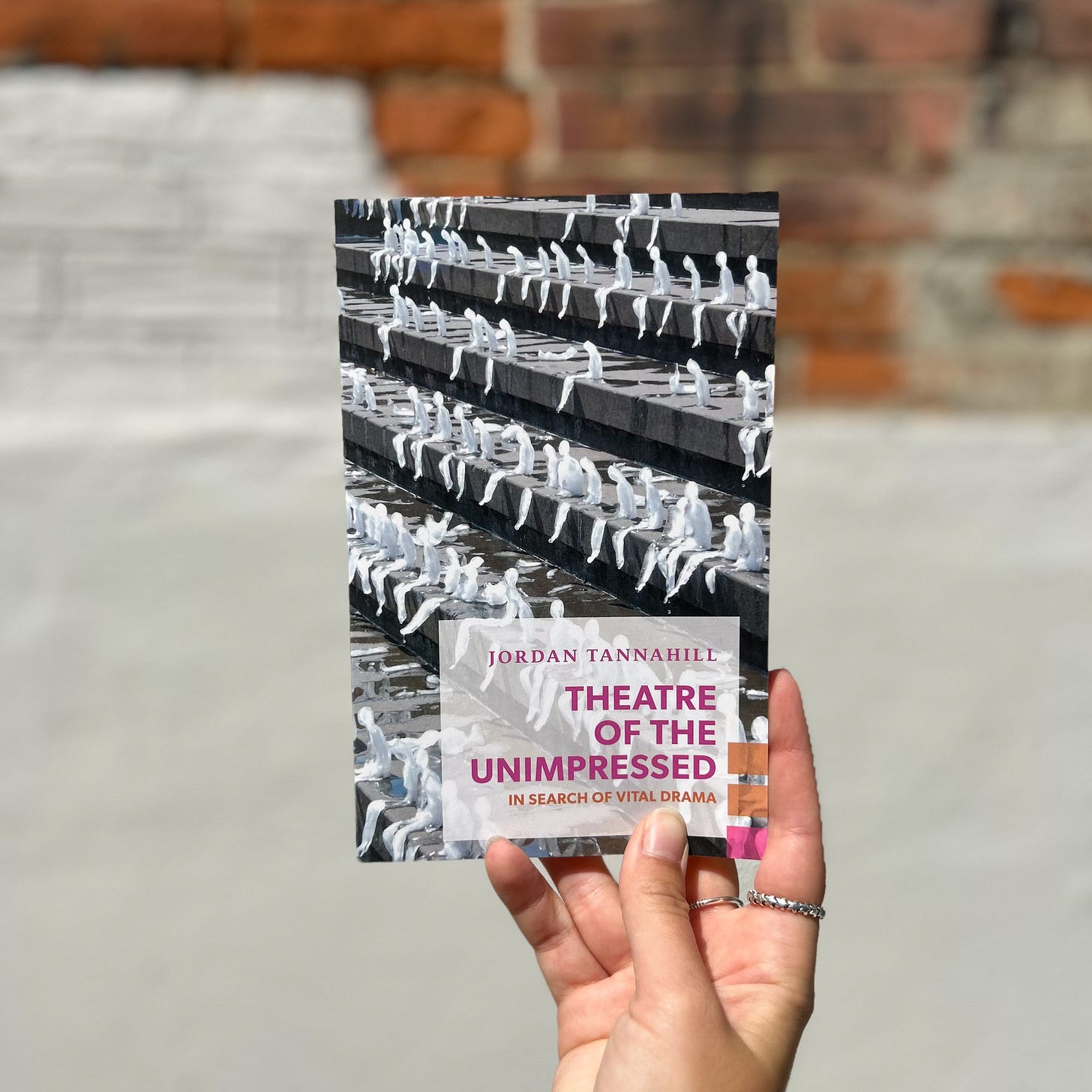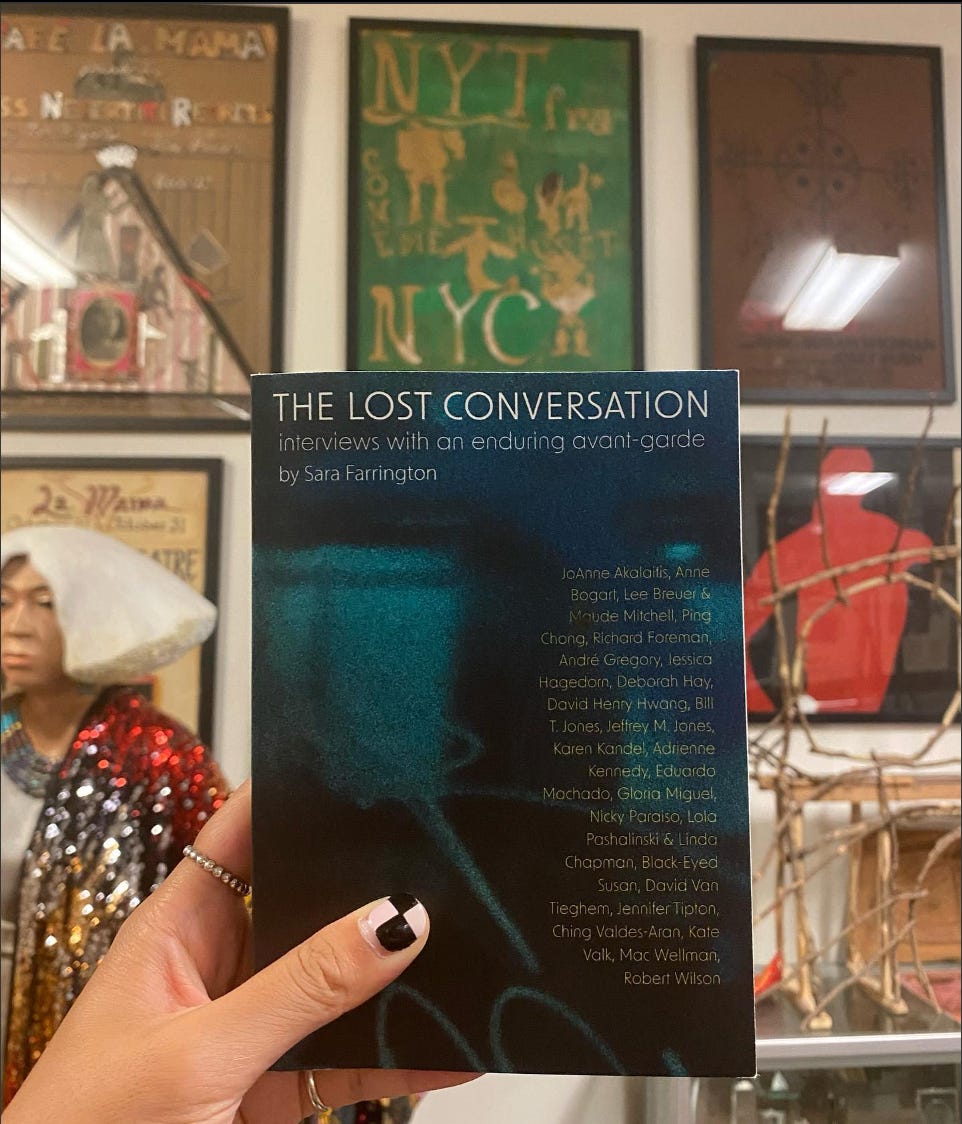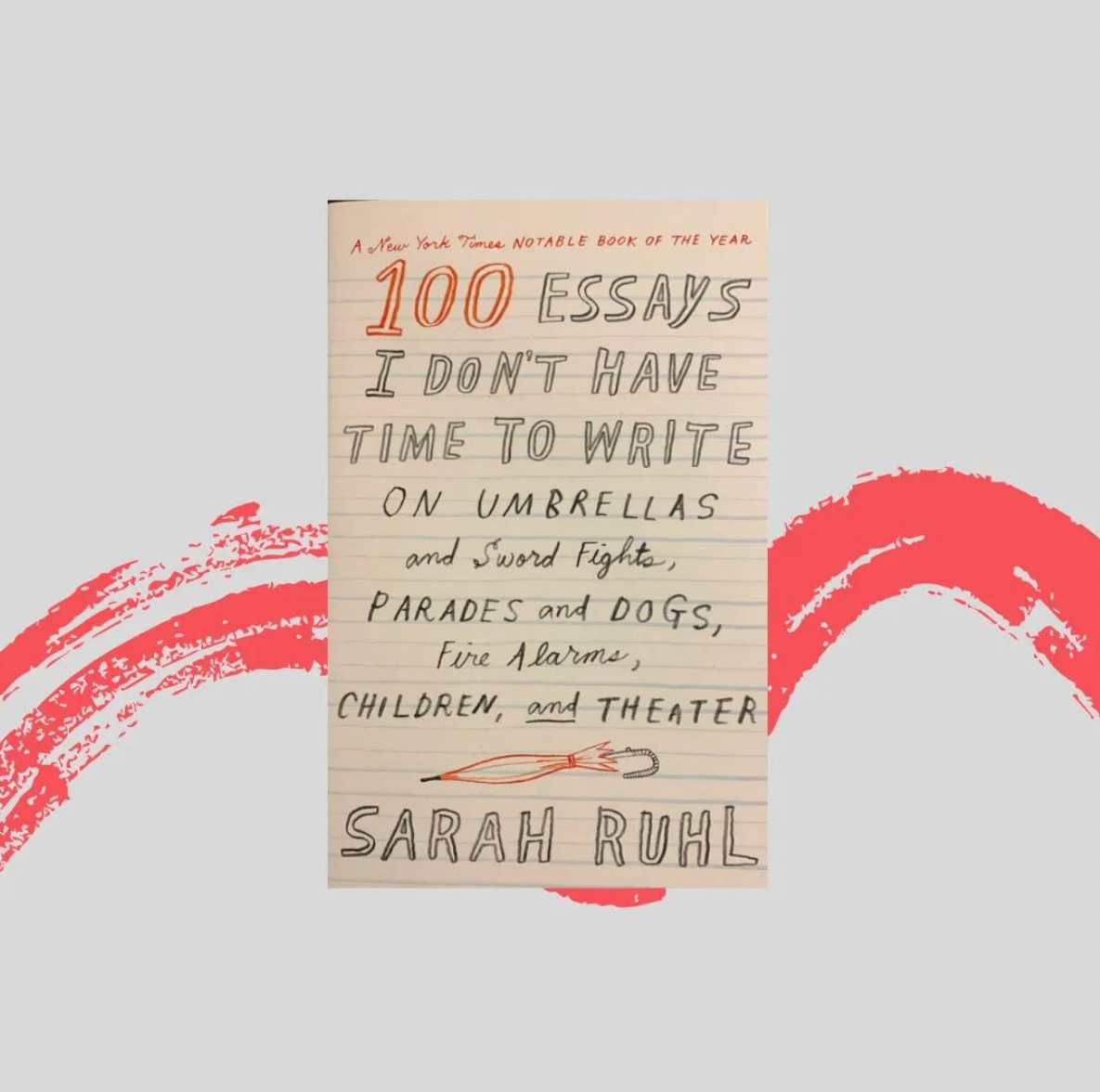so you wanna read (performance) theory
considered leaving an empty space in honor of peter brooks, who unfortunately did not make the cut this year. sorry!
Every new semester of my life begins with a book summarizing an overlooked performance theory. Sometimes, the last few chapters collect dust in my living room, but I’ll come back to them eventually. There’s so much to learn, and yet these books are always so incredibly dense. Why do you need to know about theatre’s complex history with transnational memory anyway?
But I like to believe these books are relevant for a reason, outside of my own pretentious desire to know infinitely more than anybody else. They have the power to expand your artistic perception and spark a particular interest in the field. They can inform the work you’re cultivating now and highlight the work you were consumed by in the past. But they can also be really fucking annoying.
I know that nonfiction prose doesn’t need to be easily digestible. Wrestling with complicated text can be rewarding within itself. And despite that being true, I really don’t have the time. My schedule is busier than the Broadway season. I have to meet with my psychiatrist every month.
So I wanted to share some books with you — reading suggestions for your early morning commute, when the Adderall kicks in and you have twenty minutes to spare. These books are pretty accessible, but they’re also filled with exciting new ideas. You’re still wrestling with the aesthetic purposes of performance, but you’re doing so in a way that doesn’t feel entirely academic. The text is friendly, conversational, and often egoless. They’re refreshing to read and I hope you feel the same way as I do when they’re back on your bookshelf.
I also want to say that if your totally accessible book on theatre’s complex history with transnational memory does not appear on this list, then I’m happy to read through an author’s copy for consideration! And for what it’s worth, I’m certain that another list will be coming to your inbox shortly, so your work is always under consideration.
Theatre of the Unimpressed: In Search of Vital Drama
By Jordan Tannahill
“Had I become disenchanted with the form I had once fallen so madly in love with as a pubescent, pimple-faced suburban homo with braces? Maybe theatre was like an all-consuming high school infatuation that now, ten years later, I saw as the closeted balding guy with a beer-gut he’d become. There were of course those rare moments of transcendence that kept me coming back. But why did they come so few and far between?” — Jordan Tannahill
Theatre often feels like an obligation. We’ll see our friends in shows we barely understand because it’s the polite thing to do. But theatre wasn’t always supposed to be this way. I remember reading somewhere that drama derived from ritual is supposed to resurrect us, when the world becomes increasingly more apathetic. It’s supposed to be this renewable source of comfort and change, and yet nowadays, plays feel more and more like a courtesy. I don’t when, why, or how this happened, but it’s strange to see how so many of us feel this way. It’s even stranger to see how our audiences can align with this feeling. How they’ll see one bad show and never return to the theatre again.
That’s where Jordan Tannahill’s book begins. He seeks to understand why we’re so unimpressed with today’s landscape and why we’re often so resigned to it. He talks to artists, audiences, administrators and some random guy at an orgy about the issues facing our industry. He actually goes on to compare this lackluster orgy with boring theatre. Jordan looks at real-world examples from theatre companies and avant-garde productions, exemplifying new models to emerge over the past few years. He challenges the Well Made Play — a classic theatrical framework coined by nineteenth century playwright Eugène Scribe “in which most of the story takes place before the onstage action, the action itself is a series of plot twists adhering to an Aristotelian narrative arc and the play’s climax comes at the eleventh hour, leaving [the audience] just enough time for a satisfying catharsis.”
Jordan believes that liveness must pervade past a “predictable theatre that’s risk averse and wary of failure.” He searches for a sort of theatre that demands to be theatre; a performance that needs to be live or else it will be lifeless. He ponders over a twenty-first century problem, as live performance competes with a computerized culture. Theatre is completely unique to its contemporaries because the patron is just as responsible as the performer. The audience is sitting in the room with us, so why do they have to be there? We can’t recreate the same show over and over again, when something can only be experienced live once. At least, that’s what I think Jordan is saying here and I couldn’t agree with him (or maybe just me) more.
Theatre of the Unimpressed is an absolute must read, if you’re a twenty-first century artist. Some people say the commentary feels vague, but I think that’s actually one of its many gifts. Jordan doesn’t waste your time with every oppositional response; he reaffirms what your professor often rolled their eyes at and reconsiders what theatre can be in today’s context. The book is only 150 pages long, but it will completely change the way you work in this industry.
I read Theatre of the Unimpressed when I was twenty-three, and I remember thinking how generational the dialogue seemed to be. Jordan wrote this book when he was roughly 26-27 years old, so it’s really refreshing to read something with a relatable voice. I’m always amazed that I never read this book in college, especially after Woolly Mammoth produced Botticelli in the Fire in 2018, but bullying works so get your shit together, American University. And that goes for every other American lower-case university too.
To purchase a copy of Theatre of the Unimpressed, please click here.
And if you stole my copy of Theatre of the Unimpressed, please give it back. :)
The Lost Conversation: Interviews with an Enduring Avant-Garde
By Sara Farrington
“I went to this weird school in DC, American University. Everything in Washington is run by the CIA. My favorite bookstore in Washington was run by the CIA. I applied for a job at the CIA. I didn’t get the job.” — Mac Wellman
Sara Farrington launched this project in 2019, when she was ready to give up on theatre entirely. She was workshopping a new play in Jersey City and struggled to synthesize an avant-garde script with a method style of acting. She was feeling disillusioned, like so many of us do, and decided to reach out to the artists who devoted their lives to the “disappearing” avant-garde.
These artists include but are not limited to:
Richard Foreman
Lee Breuer and Maude Mitchell
David Henry Hwang
Bill T. Jones
Eduardo Machado
JoAnne Akalaitis
Anne Bogart
Robert Wilson
Deborah Hay
Ping Chong
Nicky Paraiso
Mac Wellman
Kate Valk
Adrienne Kennedy
Throughout the collection, Sara begins almost every question with the word “how.” How were you able to finance this strange and off-site production? How could you compensate your actors, with limited budgets and monetary constraints? She even goes on to ask them about the cost of rent, and the answer will make you want to cry.
This anthology is not interested in what their work is about; it’s interested in how their work came to be. There’s clearly so much we can learn from this generation, as they weren’t risk averse or wary of failure. Some of them came from money, an unfortunate truth in every industry, but you can also sense their relationship with money was different back then. Of course, it could be, when Reagan wasn’t relentlessly attacking the NEA and diminishing organized labor, but still. They were always putting on a performance, with whatever means possible.
As I read through each and every interview, I kept thinking about the latest influx of internet trends and totally niche discourse raging rampantly online. How we’ll record these videos tied to some referential tune, until the idea itself becomes a passing trend. It’s nearly impossible to monetize on a momentary experience these days, and the ephemerality of an experimental art form is a clear embodiment of that.
Of course, I’m not advocating for an industry where unpaid labor continues to go unchecked. Every artist deserves to be properly compensated for their work and being an experimental artist in the 70s required a massive amount of privilege. Simultaneously, I look at these content creators and I can’t help but envy them. There’s so much you can make when money is not on your mind, but with $10 lattes and increased rates of inflation, how can it not be?
The Lost Conversation reads like a play, capturing the complex juncture of creative risk and demand for capitalization. Sara interviews these fascinating figures from the downtown theatre scene, who offer insight into an experimental world that we’ve already in some ways lost. It’s devastating, but what a cool and complex and captivating legacy to leave behind.
In the introduction, Sara quotes Richard Schechner, who published a eulogy to the experimental art form in Performing Arts Journal. He wrote, “the greatest failing of my generation is our failure to find a way of passing on performance knowledge. It’s great to have a tradition of experiment that engages one’s whole life. But tradition also means successors to pass your life’s knowing on to…Where are the inheritors?”
I don’t know if an avant-garde conceived in the seventies can be recontextualized for a twenty-first century audience. But the more I mull over these pages, the more I realize that maybe we’re already doing it. Anyway, I highly recommend this one if you haven’t read it yet!
The Lost Conversations: Interviews with an Enduring Avant Garde is available here.
100 Essays I Don't Have Time to Write: On Umbrellas and Sword Fights, Parades and Dogs, Fire Alarms, Children, and Theater
By Sarah Ruhl
“Canonical plays are weird. Being dead is the most airtight defense of one’s own aesthetic.” — Sarah Ruhl
“We are now supposed to have opinions before we have experiences. We are supposed to blog about our likes and dislikes before a piece of art is over. Will we evolve out of the ability to make art? Will events need to have more violence for audiences to enter them purely, to compete with the gaze of commentary? Or will everything become commentary? Will the country of children be the only country before commentary? Before we can talk? Before we can spell?” — Sarah Ruhl
Sarah Ruhl’s 100 Essays I Don’t Have Time to Write is something you certainly have time to read. It’s a collection of pocket-sized essays ruminating on sight lines, sword fights, subscription based models, and so much more. In this collection, she looks closely at the inner-workings of our creative lives, as she muses on motherhood and ponders over performance styles. The book is basically a bible for anyone who’s interested in this art form and you can see the continuation of her thoughts in Jordan Tannahill’s manifesto, recommended above (not derogatory).
100 Essays I Don’t Have Time to Write begins with a dedication to her mother, who taught her the etymology of the word essay is to try, and that’s exactly what Sarah Ruhl does here. She’s a Woolfian writer, shaping her reflections on theatre into short bite-sized essays. Her writing doesn’t require hours of endless deliberation; it’s framed for mothers with lively intrusions, part-time assistants with emails to send, and students with schoolwork and side hustles. These essays aren’t fully formed yet. They’re early sketches, designed to draw you in so that maybe you might complete the picture.
Sarah Ruhl, like Jordan Tannahill, explores the concept of the well made play, and how stories often succumb to a suppressed family secret. The secret, of course, is never staged, which makes the mystery behind the secret all the more real. We’re so quick to rely on a second-act revelation. We’ll peel back the layers of an imperceptible past because who would ever want to live in the present?
I think that’s why I’m so obsessed with the potential of performance. The larger than life notion that theatre can propel us forward only to cease itself on a conditional clause. I picture theatre as a proliferation of what would and could and should and if. When I consider the artists that came before us, whether they’re writing political punches like David Henry Hwang or have in the past staged cerebral dream plays like Richard Foreman, I’m compelled to believe they too wanted a theatre that only a present liveness can offer. I think that’s what Sarah Ruhl is advocating for here — a theatre that is not solely modern for its time, but contemporary in its form, whatever that might mean to you.
Honestly, I feel like my words could never surmount to Sarah’s collection. I wish I could copy and paste every notable paragraph, but this blog post is already longer than it needs to be. All I can say is that you are actually required to read this book, whether you like the word “whimsy” or not (you’ll get this joke later).
100 Essays I Don't Have Time to Write: On Umbrellas and Sword Fights, Parades and Dogs, Fire Alarms, Children, and Theater is available here.
That concludes today’s list of recommendations! I have read more than three books, I swear. I just don’t want to write anymore, so I’ll send another list sometime in the future. Right now, I’m reading Zelda Fichandler’s The Long Revolution: Sixty Years on the Frontlines of a New American Theater and I would definitely give this a try, if you’re interested in Arena Stage and the regional theatre movement. Here’s something that will surprise everyone who has followed me for awhile — Zelda and I actually degree on almost everything so far, but I’m still enjoying it so hopefully you will too.
(I considered writing about Zelda’s book for this list, but I know that her work will come up again in my writing, so why spoil it now?)
Happy reading!





Theatre of the unimpressed and 100 essays I don’t have time to write are both brain altering for me so I’m very excited to read your other pick!
this is a great public service